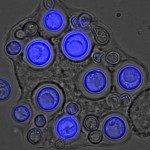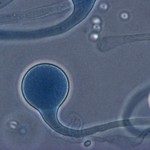Lien vers Pubmed [PMID] – 26519075
Lien DOI – 10.1007/978-1-4939-3052-4_15
Methods Mol Biol 2016 ; 1356(): 199-214
To gain more insight into the epidemiological relationships between isolates of Candida spp. obtained from various origins, several molecular typing techniques have been developed. Two methods have emerged in the 2000s as soon as enough knowledge of the Candida spp. genomes was available to choose adequate loci and primers, namely microsatellite length polymorphism (MLP) and multilocus sequence typing (MLST). To contrast with previous PCR-based methods, specific amplifications with stringent conditions easily reproducible are the basis of MLP and MLST. MLST relies on Sanger sequencing to detect single-nucleotide polymorphisms within housekeeping genes. MLP needs a first in silico step to select tandemly repeated stretches of two to five nucleotides. One of the two primers used to amplify a microsatellite locus is labeled and fragment sizing is automatically performed using high-resolution electrophoresis platforms. MLST provides results easily comparable between laboratories and active MLST schemes are publicly available for the main Candida species. For comparative studies, MLP needs standards to compensate for the electrophoretic variations depending on the platforms used. Both methods can help us gain insight into the genetic relatedness of fungal isolates, both with advantages and drawbacks, and the choice of one method rather than the other depends on the task in question.




